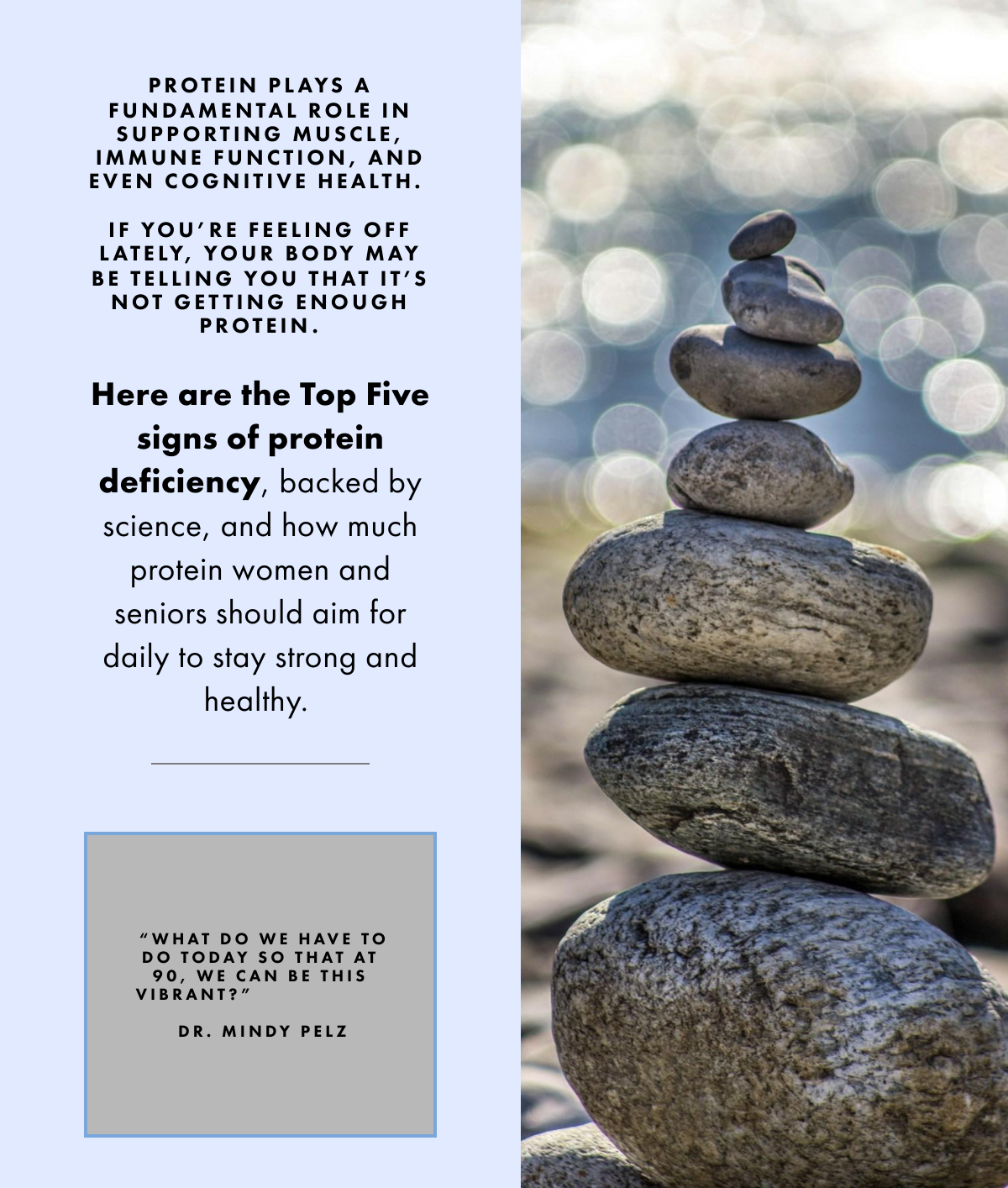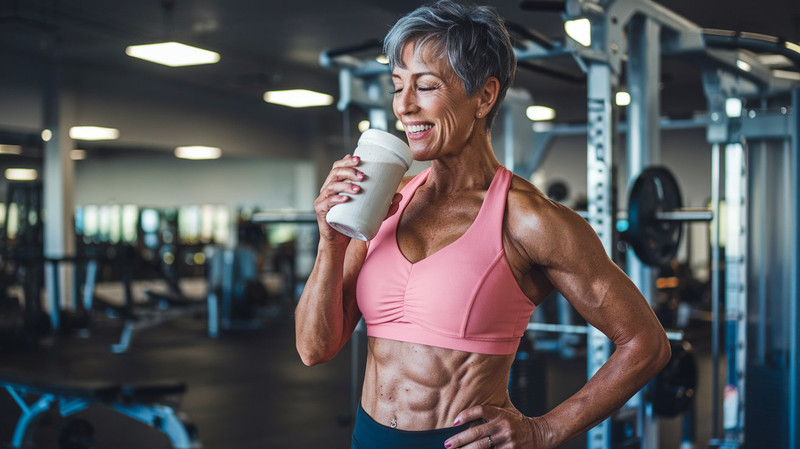5 SIGNS THAT YOU MAY BE LOW ON PROTEIN (especially women and seniors)
As we age, nutritional needs shift in ways that often go unnoticed.
And, one ESSENTIAL nutrient, PROTEIN, is most often overlooked.

1. BRAIN FOG & COGNITIVE DECLINE If you're experiencing difficulty concentrating or feeling mentally "cloudy," it could be linked to low protein intake. Protein supplies amino acids that help produce neurotransmitters, which are vital for brain function and mental clarity. A 2020 study published in Nutrients suggests that low protein intake is associated with cognitive decline in older adults, highlighting how important protein is for maintaining a sharp mind as you age.
2. MUSCLE WEAKNESS & LOSS OF STRENGTH Muscle loss, or sarcopenia, becomes a significant concern as we age, particularly for women and seniors. Without adequate protein, your body cannot repair or maintain muscle tissue. Research from The Journal of Gerontology emphasizes that muscle mass and strength are closely linked to protein intake, especially in aging populations. Loss of muscle mass can lead to frailty, falls, and fractures, particularly in elderly women. Research shows that increasing protein intake can slow down muscle loss, maintaining strength and mobility. Protein is essential for muscle repair and regeneration, helping the body stay strong and active even into advanced age If you're feeling weaker or noticing less muscle tone, this is a telltale sign you may need more protein.
Bone Health: For women, particularly post-menopausal women, the risk of osteoporosis increases dramatically. Protein, along with calcium and vitamin D, is crucial for maintaining bone density. Protein helps increase calcium absorption in the body and improves bone mass, which is essential for preventing fractures and osteoporosis.
Strength training (with free weights, weight machines, or resistance bands) can help build and maintain muscle mass and strength. What many of us don't know is that strong muscles lead to strong bones. And strong bones can help minimize the risk of fracture due to osteoporosis. So start lifting! This is a must as we age. Exercise causes muscle micro-tears that need repair and rebuilding. Protein, with its essential amino acids, plays a key role in this process. Consuming protein after a workout kickstarts muscle recovery and growth. This reduces muscle soreness, boosts strength, and enhances performance in subsequent workouts.
3. FREQUENT FATIGUE Feeling tired all the time? Protein is essential for energy production, helping to build enzymes and hormones that keep your body functioning efficiently. A study in The Journal of Nutrition found that older adults with lower protein intake experienced higher levels of fatigue and reduced endurance, which can affect daily activities. Increasing your protein could restore energy and improve stamina.
4. SLOW HEALING OF WOUNDS & INJURIES Protein is critical for tissue repair, so if your body is taking longer to heal from cuts, bruises, or injuries, this could be a sign you're not consuming enough. According to research published in Advances in Wound Care, protein deficiency can delay wound healing and increase the risk of complications. For women and seniors, healing slower than normal is a clear sign that your body is struggling to repair itself. Protein is also particularly important before and after surgeries.
5. WEAKENED IMMUNE SYSTEM & FREQUENT ILLNESS Protein is not just about muscle—it's also a key component of a healthy immune system. Antibodies and immune cells are made from protein, and when you don't get enough, your body becomes more vulnerable to infections and illnesses. A review in Clinical and Experimental Immunology explains that protein malnutrition weakens immune responses, leading to a higher susceptibility to illness. If you find yourself getting sick more often, it's time to reconsider your protein intake. Protein is needed to produce antibodies and other immune cells that fight off infections and chronic illnesses. Elderly individuals are especially vulnerable to infections, so ensuring adequate protein intake can help boost immunity and reduce susceptibility to illnesses
We love Dr. Mark Hyman and if you have some time we encourage you to watch this video:
And this video too about why women need more protein
SHOP GIDDY YO TODAY for yourself, your fam or a loved one. Giddy Yo foods also make GREAT gifts.
Reference links:
Cancer Cachexia: Definition, Staging, and Emerging Treatments - PMC (nih.gov)
https://www.health.harvard.
https://www.sciencedirect.com/
https://www.ncbi.nlm.nih.gov/
https://www.ncbi.nlm.nih.gov/
https://ajcn.nutrition.org/


ADDITIONAL IMPORTANT BENEFITS TO ADEQUATE PROTEIN INTAKE!
1. Stabilizing effect on blood sugar levels, which can reduce the risk of developing type 2 diabetes. By replacing processed carbs and sugars with clean protein sources, you can help regulate glucose levels and prevent insulin spikes. Additionally, consuming plant-based protein has been linked to lower cholesterol levels and a reduced risk of heart disease, as it avoids the saturated fats found in animal-based proteins.
2. Weight Management: Protein plays a key role in weight control by increasing feelings of satiety, helping you feel full longer, and reducing overeating. Maintaining a healthy weight is critical for preventing a wide range of chronic conditions, including heart disease, diabetes, and certain types of cancer. Protein is known for its ability to induce a sense of satiety, or fullness. This can help individuals feel satisfied for longer periods, reducing the urge to snack or overeat. This effect is attributed to protein's influence on hormones that regulate appetite, such as ghrelin and peptide YY. By promoting this feeling of fullness, protein-rich meals and snacks can be a valuable tool in managing calorie intake and supporting weight loss efforts.
How Much Protein Do You Need?
The RDA, or recommended dietary allowance, is 0.8 grams of protein per kilogram of body weight per day. To easily calculate your own RDA for protein, just multiply your weight in pounds by 0.36. For someone who is 150 pounds, that would be 54 grams of protein.
According to Dr. Mark Hyman, the catch is that the RDA is the minimum amount of protein needed to avoid getting sick, not the amount needed for optimal health. He explains how research shows several different benefits for eating more than that minimum amount.
For example, some studies suggest a protein intake above the RDA could support bone mineral density and reduce the risk of fractures. Dr. Hyman adds that the natural loss of muscle mass and strength as we age is correlated to all-cause mortality and linked to the incidence of many chronic diseases like cardiovascular disease and stroke, hypertension, insulin resistance, and type 2 diabetes. To make matters worse, these diseases increase protein degradation and reduce our ability to synthesize skeletal muscle, creating an even higher demand for protein. For these reasons, it's especially important to eat more protein as we age.
For women, the recommended daily intake is about 46 grams (see note above re: the RDA being the "minimum amount needed to avoid getting sick"), but this can vary depending on age, activity level, size, and specific health needs. As women age, protein requirements increase. According to a 2019 consensus statement in The Journal of Nutrition, Health & Aging, adults over 65 should aim for 1.0 to 1.2 grams of protein per kilogram of body weight daily. This increased intake helps combat muscle loss, support immune health, and maintain cognitive function.
Final Thoughts:
Don't let protein deficiency sneak up on you. By being aware of these warning signs and adjusting your diet to include more high-quality protein sources—whether from clean meats, plant-based proteins, or supplements—you can help safeguard your health. Whether you're a woman navigating midlife changes or a senior looking to stay vibrant, protein is your ally in keeping your body (and skin) and mind strong!
In a previous blog we talked about why we like Four Sigmatic's Protein Powders - vegan protein powder with added mushrooms and adaptogens, that not only taste great, but help you feel satisfied and fuller longer. Until I stumbled upon these protein, I was not a fan of vegan protein, however finally i've found one that works well with me and so many other, and tastes amazing! The benefits are numerous so please check out our blog from a few weeks ago- link here.
Our customer have been asking us to carry a clean protein powder for a while, so we listened! Customers enjoy this convenient protein straight up in water, or adding a scoop to their Simpla coconut yogurt (my new addiction) or in smoothies or chia pudding or or or…. Try also combining with Giddy Yo maca, our wild Canadian blueberry powder, and of course our spirulina and chlorella.
We encourage you all to ensure you're getting enough protein. Personally, not only was I surprised to learn I required more as I aged, but I also was NOT getting enough. Well that's all changed and I am more than thankful for the positive difference it's made in my life!
Blessings to you all on your health journey!




